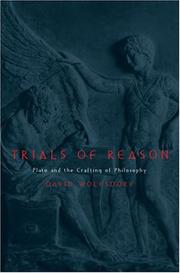| Listing 1 - 4 of 4 |
Sort by
|

ISBN: 9780195327328 0195327322 0199870640 1441600337 1281948942 019804383X Year: 2008 Publisher: Oxford Oxford university press
Abstract | Keywords | Export | Availability | Bookmark
 Loading...
Loading...Choose an application
- Reference Manager
- EndNote
- RefWorks (Direct export to RefWorks)
Philosophy, Ancient. --- Philosophie ancienne --- Plato. --- Philosophy, Ancient --- Ancient philosophy --- Greek philosophy --- Philosophy, Greek --- Philosophy, Roman --- Roman philosophy --- Aflāṭūn --- Aplaton --- Bolatu --- Platon, --- Platonas --- Platone --- Po-la-tʻu --- Pʻŭllatʻo --- Pʻŭllatʻon --- Pʻuratʻon --- Πλάτων --- אפלטון --- פלאטא --- פלאטאן --- פלאטו --- أفلاطون --- 柏拉圖 --- 플라톤 --- Plato --- Platon --- Platoon --- Платон --- プラトン
Book
ISBN: 9780521149754 9780521761307 0521149754 0521761301 9780511667510 0511667515 9781139624596 1139624598 9781139615297 1139615297 110723316X 1139609718 1139611577 1107253527 1283870983 1139620878 Year: 2013 Volume: *3 Publisher: Cambridge Cambridge university press
Abstract | Keywords | Export | Availability | Bookmark
 Loading...
Loading...Choose an application
- Reference Manager
- EndNote
- RefWorks (Direct export to RefWorks)
"The Key Themes in Ancient Philosophy series provides concise books, written by major scholars and accessible to non-specialists, on important themes in ancient philosophy that remain of philosophical interest today. In this volume Professor Wolfsdorf undertakes the first exploration of ancient Greek philosophical conceptions of pleasure in relation to contemporary conceptions. The book provides broad coverage of the ancient material, from pre-Platonic to Old Stoic treatments; and in the contemporary period, from World War II to the present. Examination of the nature of pleasure in ancient philosophy largely occurred within ethical contexts. In the contemporary period, the topic has, to a greater extent, been pursued within philosophy of mind and psychology. This divergence reflects the dominant philosophical preoccupations of the times. But Wolfsdorf argues that the various treatments are complementary. Indeed, the Greeks' examinations of pleasure were incisive, their debates vigorous and their results have enduring value for contemporary discussion"--
Philosophy, Ancient. --- Pleasure --- Philosophie ancienne --- Plaisir --- Philosophy --- Philosophie --- Philosophy, Ancient --- PHILOSOPHY / History & Surveys / Ancient & Classical --- History & Surveys --- Ancient & Classical. --- Ancient philosophy --- Greek philosophy --- Philosophy, Greek --- Philosophy, Roman --- Roman philosophy --- Arts and Humanities --- Philosophie grecque --- Plaisir (morale)
Book
ISBN: 9780198758679 0198758677 Year: 2020 Publisher: Oxford : Oxford University Press,
Abstract | Keywords | Export | Availability | Bookmark
 Loading...
Loading...Choose an application
- Reference Manager
- EndNote
- RefWorks (Direct export to RefWorks)
Early Greek Ethics is devoted to Greek philosophical ethics in its formative period, from the last decades of the sixth century BCE to the beginning of the fourth century BCE. It begins with the inception of Greek philosophical ethics and ends immediately before the composition of Plato's and Aristotle's mature ethical works Republic and Nicomachean Ethics. The ancient contributors include Presocratics such as Heraclitus, Democritus, and figures of the early Pythagorean tradition such as Empedocles and Archytas of Tarentum, who have previously been studied principally for their metaphysical, cosmological, and natural philosophical ideas. Socrates and his lesser known associates such as Antisthenes of Athens and Aristippus of Cyrene also feature, as well as sophists such as Gorgias of Leontini, Antiphon of Athens, and Prodicus of Ceos, and anonymous texts such as the Pythagorean Acusmata, Dissoi Logoi, Anonymus Iamblichi, and On Law and Justice.In addition to chapters on these individuals and texts, the volume explores select fields and topics especially influential to ethical philosophical thought in the formative period and later, such as early Greek medicine, music, friendship, justice and the afterlife, and early Greek ethnography. Consisting of thirty chapters composed by an international team of leading philosophers and classicists, Early Greek Ethics is the first volume in any language devoted to philosophical ethics in the formative period.
Ethics --- Ethics, Ancient. --- Ethics. --- Morale grecque. --- Greece.
Digital
ISBN: 9780511667510 Year: 2013 Publisher: Cambridge Cambridge University Press
Abstract | Keywords | Export | Availability | Bookmark
 Loading...
Loading...Choose an application
- Reference Manager
- EndNote
- RefWorks (Direct export to RefWorks)
Philosophy --- Antiquity
| Listing 1 - 4 of 4 |
Sort by
|

 Search
Search Feedback
Feedback About UniCat
About UniCat  Help
Help News
News